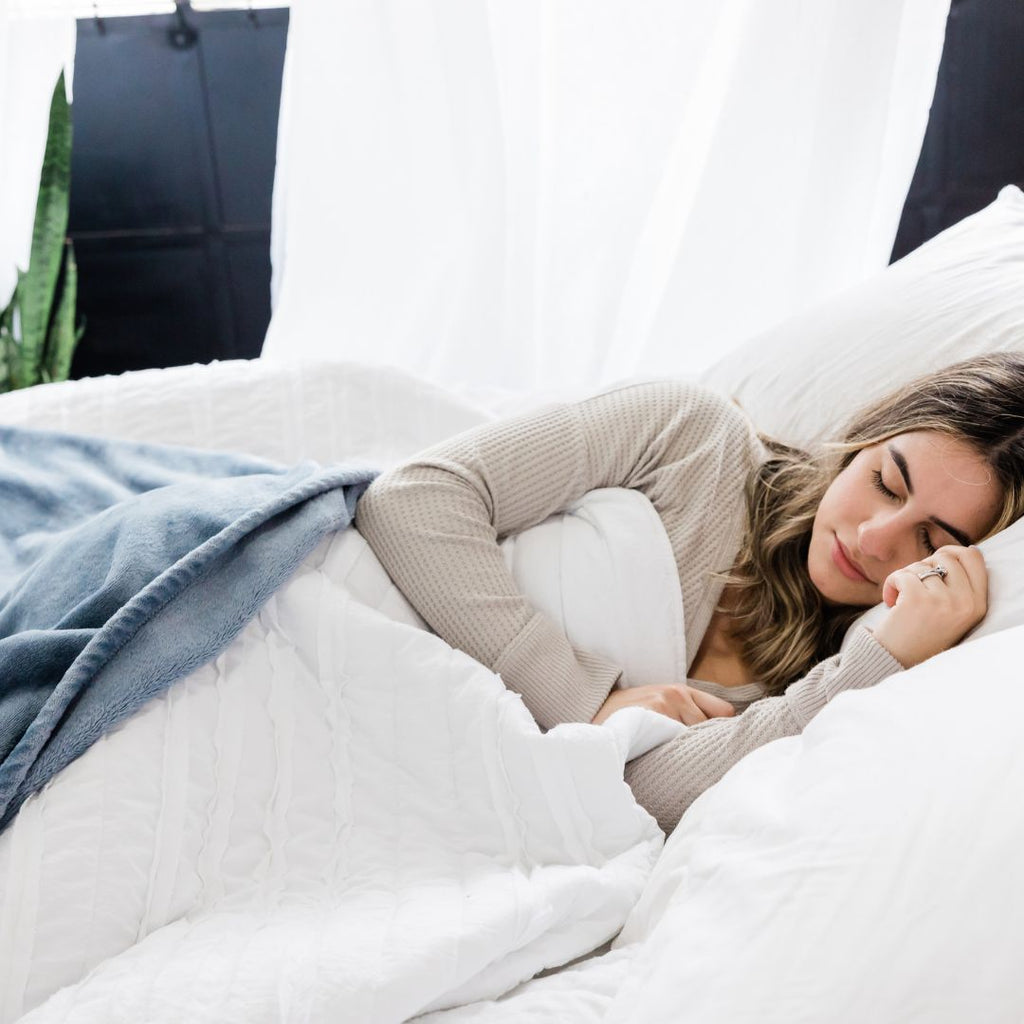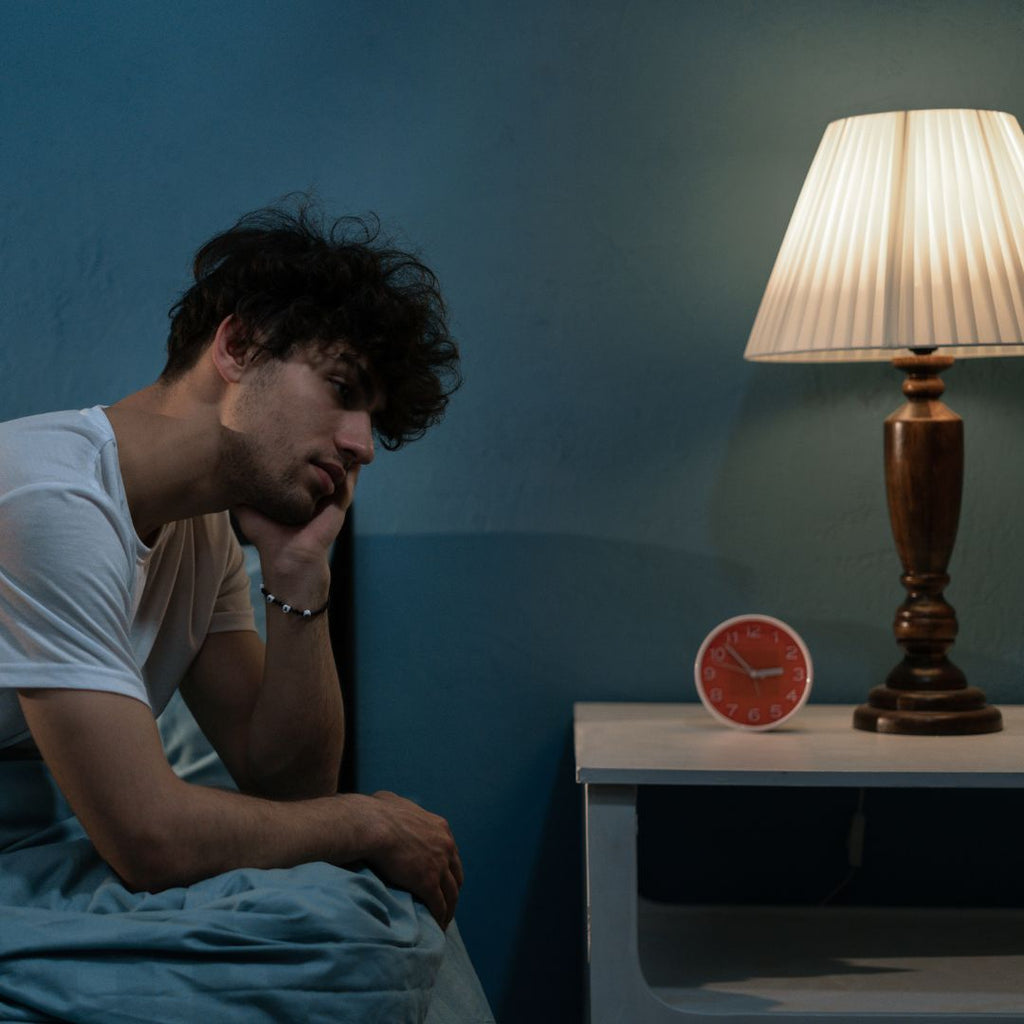How Should People Combat Insomnia? Complete Guide
Share
Discover holistic strategies to combat insomnia, from lifestyle changes to House of Wise sleep aids, for a restful night's sleep.
Understanding Insomnia
Insomnia is a common sleep disorder that can make it hard to fall asleep, hard to stay asleep, or cause you to wake up too early and not be able to get back to sleep. When you wake up, you may still feel tired. Insomnia can sap not only your energy level and mood but also your health, work performance, and quality of life.
Here, we will delve into the science of sleep, explore what insomnia is, examine its causes, understand its symptoms and effects, differentiate between its types, and discuss its impact on mental and physical health.
The Science of Sleep
Sleep is essential for our health and well-being. It allows our body and mind to rest, recharge, and repair. Understanding the biological processes that govern our sleep can shed light on why we experience insomnia and how to address it.

Common Causes of Insomnia
Insomnia can stem from a variety of factors, both psychological and physical. Identifying these causes is crucial in determining the most effective treatment approach.
- Stress: Concerns about work, health, finances, or family can keep your mind active at night.
- Travel or work schedule: Disruptions to your body's circadian rhythm can cause insomnia.
- Poor sleep habits: Inconsistent sleep schedules and stimulating activities before bed can interfere with sleep.
- Eating too much late in the evening: This can lead to physical discomfort and indigestion, affecting sleep.
- Mental health disorders: Conditions like anxiety and depression can lead to insomnia.
- Medications: Some drugs can disrupt sleep as a side effect.
- Medical conditions: Chronic pain, diabetes, and respiratory problems can make it hard to sleep.
- Sleep-related disorders: Conditions like sleep apnea can directly cause insomnia.
Symptoms and Effects of Insomnia
Experiencing insomnia can significantly affect mental and physical health.
- Difficulty falling asleep
- Waking up during the night
- Waking up too early
- Feeling unrested after sleep
- Daytime fatigue or sleepiness
- Mood disturbances
- Concentration and memory problems
- Increased errors or accidents
Types of Insomnia: Acute vs. Chronic
Insomnia is not a one-size-fits-all condition. It manifests in various forms and durations, significantly affecting the approach to treatment and management. Broadly, insomnia can be classified into two types: acute and chronic, each with its distinct characteristics and underlying causes. Understanding the differences between these types is crucial for individuals and healthcare providers alike to develop effective, personalized strategies for improving sleep.
Acute Insomnia, also known as short-term insomnia or adjustment insomnia, is often triggered by life events such as stress at work, family pressures, or traumatic events. It can also be a side effect of changes in sleep habits or environments, certain medications, or temporary health conditions. Acute insomnia is relatively common and usually resolves without medical intervention once the triggering factor is removed or the individual adapts to the new situation.
Chronic Insomnia is more complex and persistent, occurring at least three nights a week for three months or more. Unlike acute insomnia, chronic insomnia often involves a combination of factors, including long-standing stress, underlying medical or psychological conditions, and lifestyle habits that disrupt sleep.
Addressing chronic insomnia usually requires a comprehensive approach that may include behavioral therapy, lifestyle changes, and sometimes medication, aimed at treating both the insomnia and its underlying causes.
|
Feature |
Acute Insomnia |
Chronic Insomnia |
|
Duration |
A few days to weeks |
Three months or more |
|
Frequency |
Occasional |
At least three nights a week |
|
Causes |
Life stresses |
Long-term stress, health conditions |
|
Treatment Need |
Often self-resolving |
Requires comprehensive treatment |
How Insomnia Affects Mental and Physical Health
Insomnia's impact extends beyond sleep, affecting mental health, physical health, cognitive function, and overall quality of life.

- Mental Health: Insomnia can lead to or worsen mental health issues like depression and anxiety.
- Physical Health: It increases the risk for several conditions, including heart disease and diabetes.
- Cognitive Function: Sleep deprivation affects attention, concentration, and memory.
- Quality of Life: Chronic insomnia can significantly reduce energy, motivation, and the ability to perform daily tasks.
Lifestyle Adjustments to Combat Insomnia
Improving sleep quality and combating insomnia often starts with making simple yet effective changes to daily routines and environments. Lifestyle adjustments can significantly influence our sleep health, from the food we eat to our physical activity levels and the atmosphere of our sleeping spaces. Let's explore how these factors contribute to better sleep and what specific changes can help alleviate insomnia.
The Role of Diet in Sleep Quality
What we consume has a profound effect on our sleep cycles. Certain nutrients and foods can enhance the body's natural sleep processes, while others may disrupt them. A balanced diet rich in fruits, vegetables, whole grains, and lean proteins can promote better sleep by regulating neurotransmitters and hormones involved in the sleep-wake cycle.
Foods to Include:
- Cherries: One of the few natural sources of melatonin, the hormone that regulates the sleep-wake cycle.
- Nuts (Almonds, Walnuts): Rich in magnesium and serotonin, aiding in muscle relaxation and sleep induction.
- Bananas: High in potassium and magnesium, they help relax overstressed muscles and calm the nervous system.
- Complex Carbohydrates: Foods like whole-grain bread, cereals, pasta, and rice help prevent blood sugar spikes and aid in serotonin production.
- Leafy Greens: Spinach, kale, and collards are rich in calcium, which helps the brain use tryptophan to manufacture melatonin.
Foods to Avoid:
- Caffeine: Found in coffee, tea, chocolate, and some soft drinks, it can disrupt sleep patterns if consumed late in the day.
- Alcohol: Although it might initially act as a sedative, it can interrupt the sleep cycle, leading to fragmented sleep.
- Heavy or Spicy Foods: Eating big or spicy meals close to bedtime can lead to discomfort and indigestion, making it hard to fall asleep.
- High-Sugar Foods: Sugar can spike your energy levels and lead to a crash, affecting your sleep quality.
Importance of Physical Activity
Regular physical activity can help you fall asleep faster and enjoy deeper sleep. Exercise increases the amount of time spent in deep sleep, the most physically restorative sleep phase. It also helps to stabilize mood and decompress the mind, a cognitive process that is important for naturally transitioning to sleep.

Exercise Routines That Promote Restful Sleep
- Aerobic Exercises: Activities like walking, running, and swimming boost heart health and reduce insomnia by decreasing arousal, anxiety, and depressive symptoms.
- Yoga and Stretching: These practices can help calm the mind and relieve tension in the body, making it easier to fall asleep.
- Strength Training: Building muscle can contribute to overall better sleep quality, though it's best to avoid high-intensity workouts close to bedtime as they may increase energy levels and body temperature.
Creating a Sleep-Inducing Environment
The environment where we sleep plays a critical role in how easily we fall asleep and how well we stay asleep. Creating a space conducive to rest is key to combating insomnia.
Optimizing Your Bedroom for Sleep
- Keep It Cool, Dark, and Quiet: A slightly cool temperature, the absence of light, and a reduction in noise levels can signal your brain that it's time to sleep.
- Invest in a Good Mattress and Pillows: Comfort is crucial. Ensure your mattress and pillows support your body well and replace them when they begin to wear out.
- Limit Screen Time: The blue light emitted by phones, tablets, and computers can interfere with your ability to fall asleep. Try to avoid these screens at least an hour before bedtime.
- Use Relaxing Scents: Aromatherapy using lavender or chamomile can help reduce anxiety and induce a state of calmness, making it easier to drift off to sleep.
Behavioral and Psychological Strategies
The battle against insomnia often requires more than just physical adjustments; it necessitates changes in behavior and mindset as well. Behavioral and psychological strategies have been proven effective for many individuals struggling with sleep disorders, offering long-term solutions without the need for medication.
Cognitive-Behavioral Therapy for Insomnia (CBT-I)
CBT-I stands out as a highly effective treatment for insomnia, targeting the thoughts and actions that disrupt sleep. This structured program helps individuals identify and replace beliefs and behaviors that cause or worsen sleep problems with habits that promote sound sleep.
Unlike medication, CBT-I addresses the underlying causes of insomnia, providing skills and strategies that are useful for a lifetime. Sessions might include techniques for stress reduction, relaxation, and sleep schedule management, aiming to change the mindset around sleep.
Relaxation Techniques and Mindfulness
Stress and anxiety are common culprits behind insomnia, and relaxation techniques can be powerful tools in calming the mind and preparing the body for sleep. Methods such as deep breathing exercises, progressive muscle relaxation, and guided imagery can reduce muscle tension and decrease heart rate, making it easier to fall asleep.
Mindfulness meditation, focusing on being present and aware of the moment without judgment, has also been shown to improve sleep quality by reducing stress levels and helping individuals break the cycle of sleepless nights.
The Power of Sleep Hygiene
Sleep hygiene refers to the set of practices and habits that are conducive to sleeping well on a regular basis. This includes maintaining a consistent sleep schedule, making the bedroom a comfortable and sleep-friendly environment, and engaging in relaxing activities before bedtime.
Avoiding stimulants such as caffeine and nicotine close to bedtime, as well as limiting exposure to screens and electronic devices in the evening, are also key components of good sleep hygiene. By fostering a routine that supports the natural sleep-wake cycle, individuals can enhance both the quality and quantity of their sleep.
Medical Interventions for Insomnia
While behavioral and lifestyle changes are effective for many, some cases of insomnia may require medical intervention. It's essential to understand when to seek professional help and what treatment options are available.
When to See a Doctor
It's time to consult a healthcare provider if insomnia becomes a persistent problem that affects your daily life, or if you experience symptoms like chronic fatigue, mood disturbances, or decreased performance at work or school.

A doctor can help identify any underlying conditions or factors contributing to insomnia and recommend appropriate treatments, which may include behavioral therapies, medication, or a combination of both.
Overview of Medications for Insomnia
Various medications can help treat insomnia, including prescription sleep aids, over-the-counter drugs, and supplements. While these can be effective in the short term, they are usually not recommended as a long-term solution due to potential side effects and the risk of dependency. Prescription medications should be used under the guidance of a healthcare professional, who can determine the most suitable type and dosage based on the individual's health status and specific sleep issues.
Alternative and Complementary Therapies
In addition to conventional treatments, many individuals find relief from insomnia through alternative and complementary therapies. This can include acupuncture, yoga, and the use of supplements such as melatonin or valerian root.
Herbal teas and aromatherapy with essential oils like lavender have also been reported to have calming effects that can facilitate sleep. While the effectiveness of these treatments can vary from person to person, they offer additional options for those seeking to enhance their sleep without pharmaceuticals.
House of Wise Sleep Solutions
In today's fast-paced world, finding natural and effective solutions for sleep can be a game-changer for those struggling with insomnia. House of Wise offers a carefully curated selection of sleep aids designed to promote relaxation and improve sleep quality, without the need for pharmaceuticals. Here's how our products can help you reclaim the night and wake up feeling refreshed and ready to tackle the day.
Sleep Gummies
Our sleep gummies are crafted with natural ingredients known to support a peaceful night's sleep. Each gummy is formulated to help you unwind after a long day, easing you into a restful state without the grogginess often associated with traditional sleep aids. Perfect for those who prefer a tasty, convenient option, our gummies make bedtime a treat rather than a chore.
CBD Sleep Gummies
For those seeking a deeper level of relaxation, our CBD sleep gummies combine the calming effects of CBD with natural sleep enhancers. CBD, or cannabidiol, is known for its ability to reduce anxiety and improve sleep quality. By incorporating CBD into our sleep gummies, we offer a powerful tool against insomnia, helping to regulate your sleep cycle and promote a more restorative sleep.
Sleep Drops
Our sleep drops are designed for quick absorption and ease of use, providing a customizable option for sleep support. A few drops under the tongue before bed can facilitate a quicker transition to sleep, thanks to a blend of ingredients tailored to calm the mind and body. These drops are an ideal choice for those who prefer a more direct approach to their sleep routine.

Sleep Candles
Setting the right atmosphere is crucial for a good night's sleep. Our sleep candles are crafted with a blend of essential oils chosen for their soothing properties. The gentle flicker of the candlelight combined with calming scents like lavender and chamomile can transform your bedroom into a tranquil oasis, perfect for easing into sleep. Incorporating these candles into your nighttime routine can help signal to your body that it's time to wind down.
Personalizing Your Approach to Overcoming Insomnia
Successfully managing insomnia often requires a tailored approach that takes into account your unique lifestyle, habits, and preferences. Understanding your sleep patterns and experimenting with different strategies are crucial steps in developing a personalized plan that can lead to long-lasting improvements in sleep quality.
Understanding Your Sleep Patterns
The first step in personalizing your approach to overcoming insomnia is to gain a deep understanding of your own sleep patterns. This involves tracking when you go to bed, how long it takes you to fall asleep, the number of awakenings throughout the night, and the total sleep time.
Many find it helpful to keep a sleep diary or use a sleep tracker to gather this data. Recognizing patterns in your sleep can help identify the factors that may be contributing to your insomnia, such as stress, dietary habits, or irregular sleep schedules.
Experimenting with Different Strategies
With a clear understanding of your sleep patterns, you can begin to experiment with various strategies to improve your sleep. This might include adjusting your sleep environment, experimenting with relaxation techniques before bed, or modifying your diet.
It's important to make changes one at a time so you can accurately assess their effect on your sleep. Remember, what works for one person may not work for another, so be patient and willing to try different approaches until you find what works best for you.
The Bottom Line
To conclude, overcoming insomnia is a multifaceted journey that involves lifestyle changes, personal adjustments, and sometimes, external aids like House of Wise's sleep products. By understanding your unique sleep challenges and experimenting with tailored solutions, you can enhance your sleep quality and overall life. Embrace these strategies with patience and persistence for a healthier, more restful future.
